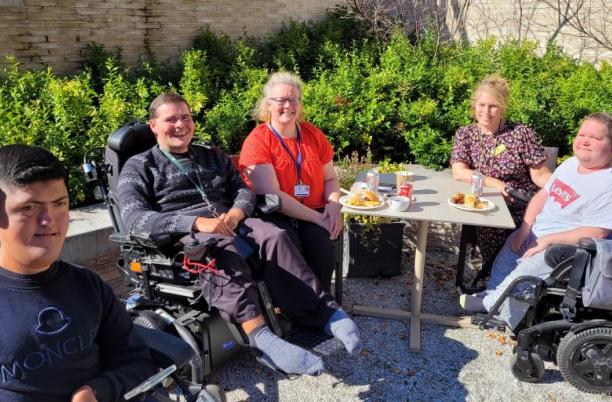
Young Adult Service

The Prince and Princess of Wales Hospice has developed a pioneering service to support the wellbeing of young adults living with life-limiting conditions and their families as they move from child to adult hospice services.
Title
About this innovation example
Project and outcomes
Project overview
Young people with life-limiting conditions are living longer and this should be celebrated. However, it can be difficult for them and their families to access appropriate support for their complex care needs, especially when transitioning from children to adults’ hospice services.
The Prince & Princess of Wales Hospice wanted to address the inequality and health gaps facing this cohort of young adults. In co-production with young people and their families, they developed a service that includes:
- a Transition Clinic, which holistically assesses the needs of each young adult and their family
- resident artists
- a music therapist
- an inpatient unit
- family support (including parents, carers and siblings)
- a pilot short breaks/respite care service
- advance care planning.
The hospice aims to provide person-centred support for each young adult, depending on their needs and preferences. It works collaboratively with other health, social care and education services to co-ordinate transition and develop a holistic model of care.
Outcomes
The Young Adult Service has developed over time and with the involvement and feedback of young people. The hospice team is now seen as lead professionals for young adults with life limiting conditions and the service won the Hospice UK Award for Tackling Inequalities in 2022.
The hospice empowers and advocates for young people, helping them share their stories locally and nationally. On an individual level, the hospice has:
- helped a young adult with a rare condition gain access to an orphan medication that could improve their wellbeing
- supported one young adult to challenge their right to eat orally (the decision was made not to feed them orally when they were at school, but now they are a working adult and feel they are being denied a fundamental human right - the enjoyment of food and drink).
The service is also working with Children’s Hospices Across Scotland (CHAS), NHS Managed Networks, the Scottish Partnership for Palliative Care and the Scottish Government to promote and develop transition services across Scotland.
Facilitators, challenges and advice
Key facilitators
Although the young adults who use the service have complex needs and live with conditions that hospice staff might not have seen before, the staff team has transferable skills which they have been able to use to support young people and their families effectively.
The service uses a human rights approach, which is reflected across the hospice and nationally. The Scottish Government’s Getting It Right For Every Child (GIRFEC) policy aims to provide all children, young people and their families with the right support at the right time.
The SHANARRI indicators are a key part of GIRFEC. They provide a consistent framework that staff can use when assessing young people’s wellbeing. They state that children and young people should be:
- Safe
- Healthy
- Achieving
- Nurtured
- Active
- Respected
- Responsible
- Included.
This has enabled the hospice to have discussions with young adults and families about issues that may not be broached otherwise. For example, having a fire evacuation plan, making sure young people are able to achieve what they want to in life, and maintaining as much independence as possible.
Challenges
It has been challenging to provide mental health support for young people. Local mental health services have reluctant to accept referrals. The hospice is advocating locally for mental health services for young adults with life limiting conditions and trying to raise awareness of the needs of this cohort.
Tips and advice
Encourage the young adult voice. Always work with young adults to find out what they need. Be open to learning and prepare to challenge your own misconceptions.
Think about what your hospice already has and what you need to do differently. Where do you have transferable skills that you can utilise for working with young adults?
Future development
The hospice would like to develop more partnerships with paediatrics teams so that transition support can start earlier. The team is also looking for Learning Disability partners who can help support the increasing number of young people being referred to the service with a neurodisability.
The Scottish Government plans to establish a National Care Service by 2026. The core values of the service will be equality, dignity and human rights. The Prince & Princess of Wales Hospice will continue to lobby the Scottish Government and other hospices to raise awareness of the inequality in support for young adults with a life limiting condition and promote the need for holistic services.

